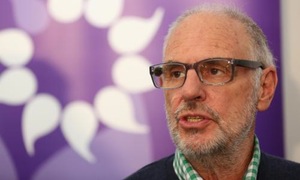
The Medical Board of Australia “misconstrued” the medical code of conduct when it upheld the suspension of voluntary euthanasia advocate Dr Philip Nitschke’s medical licence, Darwin’s supreme court has heard.
Nitschke appeared in court on Wednesday to challenge the decision by the Northern Territory Health Professional Review Tribunal to uphold the suspension of his medical registration by the South Australian branch of the medical board in 2014.
The board made the decision in an emergency meeting in July last year following complaints that Nitschke, who is a director of the euthanasia advocacy group Exit International, had counselled a depressed but otherwise healthy 45-year-old man, Nigel Brayley, who later took his own life, as reported by the ABC.
In appealing against the suspension, Nitschke’s legal team maintained there was no doctor-patient relationship between him and Brayley, that he did not counsel Brayley, and that the suspension was driven by the board’s distaste for his views on voluntary euthanasia and rational suicide. However the board found against Nitschke and the suspension was upheld.
On Wednesday, Nitschke’s legal team – led by Richard Niall QC after the death of Nitschke’s former lawyer Peter Nugent last month – said the medical board “misconstrued” its code of conduct when suspending Nitschke’s licence, and denied procedural fairness during the November hearing.
Because the code is made out of statutory powers, “a misconstruction of the code is an error of law”, Niall told the court.
“If the tribunal misunderstands the code, or misapplies it, they’ve applied a standard which is not the standard of conduct applicable to the conduct of the practitioner.
“That is a legal error.”
The team specifically challenged paragraph 54 of the tribunal’s findings which said Nitschke had “sufficient connection with his profession” in his dealings with Brayley, and so his conduct was bound by the code.
Niall said if the board was to enact powers of the code which allowed for immediate action against a practitioner who poses a serious risk to persons, it had to be because that practitioner’s conduct “gives rise to the risk”.
“There would be no point in exercising an [emergency] power if the conduct had nothing the do with medical practice,” said Niall.
Nitschke’s conduct was alleged to be a failure to act in his obligations as a medical practitioner by not intervening in Brayley’s plans to kill himself – an accusation Nitschke has disputed. Niall said the board had also conflated his alleged actions as a doctor with “separate and distinct” actions as the head of Exit International.
The tribunal’s findings had said it was “not the conduct of itself that attracts the complaints”.
“It is the fact that it is the conduct of a registered medical practitioner. Suspension of that registration is therefore effective in preventing the conduct.”
It had also found there was “ample authority” to say censured conduct need not be in a doctor-patient relationship.
The legal arguments in the supreme court differed from those presented during the tribunal hearing. Both sides now have “common ground” in accepting there was no doctor-patient relationship between Nitschke and Brayley, Justice Graham Hiley clarified at the beginning of the day.
Before Wednesday’s hearing Nitschke told media outside the court he believed he was being made a “scapegoat” for his views because the board has also lodged 12 other complaints against him.
“They don’t like the fact that I’m advocating in the way that I do, and I’m able to call myself a doctor,” he said. “They’ve said to me they would be happier if I wasn’t a doctor.”
He said he felt “hounded” and accused the board of trying to silence him by stripping him of his medical licence.
“They’ve never willingly engaged with the issue of end-of-life choices, and if they need a scapegoat, I guess they’ve chosen me.”
He said if the supreme court challenge was successful he would be challenging the 12 complaints.
The case continues in Darwin, with arguments from the medical board yet to be heard. The case is expected to run for two days.
The Metropolitan police in London have also begun investigating Nitschke, requesting he present himself for an interview in relation to an allegation Nitschke believes stems from a workshop he held in 2013.
